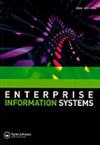Blockchain technology in industry 4.0
IF 3.9
4区 计算机科学
Q1 COMPUTER SCIENCE, INFORMATION SYSTEMS
引用次数: 1
Abstract
Industry 4.0 was initially introduced during the Hannover Fair in 2011. In 2013, it was officially announced as a German strategic initiative to take a pioneering role in industries currently revolutionising the manufacturing sector. Industrie 4.0, also called Industry 4.0, symbolises the beginning of the Fourth Industrial Revolution. Industry 4.0 represents the current trend of automation technologies in the manufacturing industry, and it mainly includes enabling technologies such as the cyber-physical systems (CPS), Internet of Things (IoT), and cloud computing (Gorkhali 2022; Karnik et al. 2022; Li 2020; Li & Zhou, 2021; Sigov et al. 2022; Xu 2020). Various technologies can be used to implement Industry 4.0. These technologies include CPS, IoT, cloud computing, industrial information integration, and blockchain technology. World Economic Forum (2015) predicted that by 2027 10% of global GDP will be stored on blockchain technology. In recent years, the interest in studying the role to be played by blockchain in the manufacturing sector has been increasing. As a result, some companies have started integrating the blockchain concept into manufacturing practices (Gorkhali, Li, Shrestha 2020; Xu, Lu, and Li 2021). Potential applications of blockchain in Industry 4.0 include promoting resilience, scalability, security, and autonomy, as well as the usage of blockchain to timestamp sensor data. According to a recent study, Industry 4.0 and blockchain will significantly impact future enterprise information systems. This special issue (SI) aims to allow researchers and practitioners to share the most recent advances in Industry 4.0-related blockchain technologies from enterprise information systems perspectives. To foster a coherent, cumulative body of knowledge regarding blockchain technology in Industry 4.0, this SI presents eight articles authored by scholars from China, Hungary, Thailand, the US, and other countries. In addition, all authors were asked to respond to at least two rounds of peer review to prepare for this issue. In the paper entitled ‘Building trust of Blockchain-based Internet-of-Thing services using public key infrastructure’, Viriyasitavat et al. (2022) introduce a generic architecture design that incorporates Public Key Infrastructure (PKI) to establish the trust in BIoT services. In the paper entitled ‘A novel service level agreement model using blockchain and smart contract for cloud manufacturing in industry 4.0’, Tan et al. (2021) proposed a method to facilitate data security. Szabó, Ternai, and Fodor (2022), in their paper entitled ‘Affordances in blockchain-based financial recommendations concerned with life events and personalities’, aim to discover affordances in blockchain when designing an AI-based financial recommendation system as a decision support system. Bi et al. (2022), in their paper ‘Security and safety assurance of collaborative manufacturing in industry 4.0’, considered that Industry 4.0 provides an ideal platform to support a direct interaction of humans and machines in adapting to changes and uncertainties in system operations. In the paper entitled ‘Blockchain technology–recent research and future trend’ (Zheng and Lu 2021), the authors introduce the future research directions of blockchain. In the ENTERPRISE INFORMATION SYSTEMS 2022, VOL. 16, NO. 12, 1733–1735 https://doi.org/10.1080/17517575.2022.2095535区块链技术在工业4.0
工业4.0最初是在2011年汉诺威工业博览会期间推出的。2013年,它被正式宣布为德国的一项战略举措,旨在引领当前制造业革命的行业。工业4.0,也被称为工业4.0,象征着第四次工业革命的开始。工业4.0代表了制造业自动化技术的当前趋势,主要包括网络物理系统(CPS)、物联网(IoT)和云计算等使能技术(Gorkhali 2022;Karnik et al. 2022;李2020年;Li & Zhou, 2021;Sigov et al. 2022;徐2020)。多种技术可用于实现工业4.0。这些技术包括CPS、物联网、云计算、工业信息集成、区块链技术等。世界经济论坛(2015)预测,到2027年,全球GDP的10%将存储在区块链技术上。近年来,研究bb0在制造业中所扮演的角色的兴趣越来越大。因此,一些公司已经开始将区块链概念整合到制造实践中(Gorkhali, Li, Shrestha 2020;Xu, Lu, and Li 2021)。区块链在工业4.0中的潜在应用包括提高弹性、可扩展性、安全性和自主性,以及使用区块链对传感器数据进行时间戳。根据最近的一项研究,工业4.0和区块链将对未来的企业信息系统产生重大影响。本期特刊(SI)旨在让研究人员和从业者从企业信息系统的角度分享与工业4.0相关的区块链技术的最新进展。为了建立一个关于工业4.0区块链技术的连贯、累积的知识体系,本SI提供了来自中国、匈牙利、泰国、美国和其他国家的学者撰写的八篇文章。此外,所有作者都被要求对至少两轮同行评议做出回应,为本期做准备。在题为“使用公钥基础设施构建基于区块链的物联网服务的信任”的论文中,Viriyasitavat等人(2022)介绍了一种通用架构设计,该设计结合了公钥基础设施(PKI)来建立对BIoT服务的信任。在题为“工业4.0中使用区块链和智能合约的新型服务水平协议模型”的论文中,Tan等人(2021)提出了一种促进数据安全的方法。Szabó, Ternai和Fodor(2022)在他们题为“与生活事件和个性有关的基于区块链的金融建议中的能力”的论文中,旨在在设计基于人工智能的金融推荐系统作为决策支持系统时发现区块链中的能力。Bi等人(2022)在其论文《工业4.0中协同制造的安全和安全保障》中认为,工业4.0提供了一个理想的平台,支持人和机器的直接交互,以适应系统运行中的变化和不确定性。在题为“区块链技术-近期研究和未来趋势”(Zheng and Lu 2021)的论文中,作者介绍了区块链的未来研究方向。在企业信息系统2022,VOL. 16, NO. 1。12, 1733-1735 https://doi.org/10.1080/17517575.2022.2095535
本文章由计算机程序翻译,如有差异,请以英文原文为准。
求助全文
约1分钟内获得全文
求助全文
来源期刊

Enterprise Information Systems
工程技术-计算机:信息系统
CiteScore
11.00
自引率
6.80%
发文量
24
审稿时长
6 months
期刊介绍:
Enterprise Information Systems (EIS) focusses on both the technical and applications aspects of EIS technology, and the complex and cross-disciplinary problems of enterprise integration that arise in integrating extended enterprises in a contemporary global supply chain environment. Techniques developed in mathematical science, computer science, manufacturing engineering, and operations management used in the design or operation of EIS will also be considered.
 求助内容:
求助内容: 应助结果提醒方式:
应助结果提醒方式:


